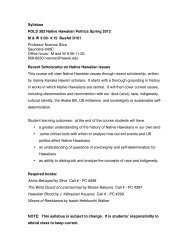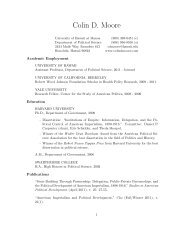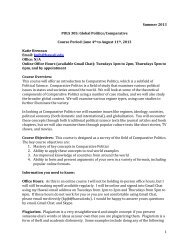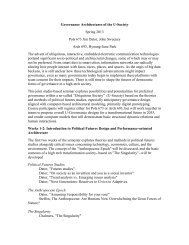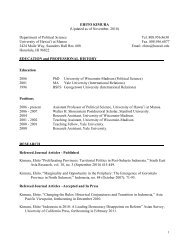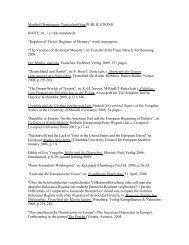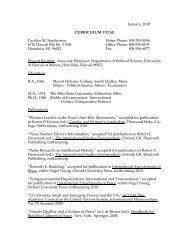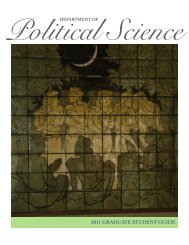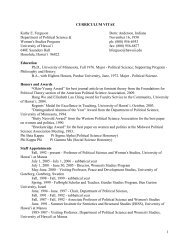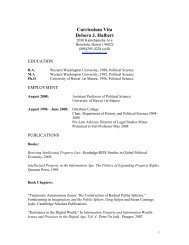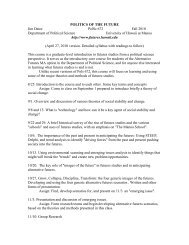Spring 2013 POLS 302 Syllabus [PDF] - Department of Political ...
Spring 2013 POLS 302 Syllabus [PDF] - Department of Political ...
Spring 2013 POLS 302 Syllabus [PDF] - Department of Political ...
You also want an ePaper? Increase the reach of your titles
YUMPU automatically turns print PDFs into web optimized ePapers that Google loves.
Pr<strong>of</strong>. Noelani Goodyear-Kaʻōpua Office: Saunders 609<br />
goodyear@hawaii.edu<br />
Office hours: T/R 10am-12pm<br />
6. Practice movement-building by designing campaigns around student-chosen<br />
issues.<br />
7. Practice critical reading, research and public comment on government and media<br />
documents.<br />
8. Examine and participate in group decision-making and visioning processes<br />
related to Hawaiʻiʻs future.<br />
9. Connect the course content to previous experiences and future commitments in<br />
your life.<br />
Required Texts<br />
Because this course focuses primarily on current issues, the majority <strong>of</strong> the readings will<br />
be available through Laulima and our course website. We will be reading selections from<br />
the books listed below. They are excellent references and I recommend buying them,<br />
however the relevant sections will be made available to you in digital form.<br />
Recommended texts:<br />
Cooper, George, and Gavan Daws. Land and Power in Hawaii: The Democratic Years.<br />
Honolulu: University <strong>of</strong> Hawaii Press, 1990.<br />
Trask, Haunani-Kay. From a Native Daughter: Colonialism and Sovereignty in Hawaiʻi.<br />
Revised ed. Honolulu: University <strong>of</strong> Hawaiʻi Press, 1999.<br />
Van Dyke, Jon M. Who Owns the Crown Lands <strong>of</strong> Hawaiʻi? Honolulu: University <strong>of</strong><br />
Hawaiʻi Press, 2008.<br />
Assignments and Grading<br />
15% Written & Oral Exercises in-class on readings<br />
(3 pts for 10 class sessions = 30 pts possible)<br />
If you want to pass the class and make the most <strong>of</strong> your learning experience, you must<br />
do all the readings and come to class prepared to discuss them. The written and oral<br />
exercises in class are designed to help you process the readings, as well as to<br />
demonstrate that youʻve done them prior to arriving at class. They may include written<br />
summaries, impromptu debates, guided discussion, role-plays, and other formats.<br />
Activities will generally be done at the beginning <strong>of</strong> the class. Sometimes they will be<br />
group activities. You need to be in class in order to earn the points. Both written and<br />
oral exercises will be graded on the following scale:<br />
3 – Shows you understood the reading and put in stong effort. Actively worked to<br />
include contributions from all group members in group work.<br />
2 – Some effort. Shows only partial reading. For group work, draws only on<br />
contributions from some group members.<br />
1 – Made an attempt but didnʻt show any understanding <strong>of</strong> the reading. Group<br />
work relies only on one individual.<br />
0 – No attempt.<br />
20% Engaged learning (40 pts)<br />
2


![Spring 2013 POLS 302 Syllabus [PDF] - Department of Political ...](https://img.yumpu.com/22818451/2/500x640/spring-2013-pols-302-syllabus-pdf-department-of-political-.jpg)
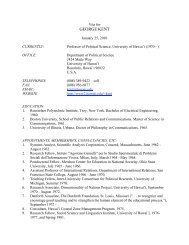
![Fall 2012 POLS 620 Syllabus [PDF] - Department of Political Science](https://img.yumpu.com/25416938/1/190x245/fall-2012-pols-620-syllabus-pdf-department-of-political-science.jpg?quality=85)
